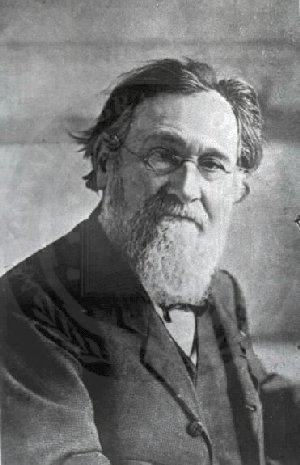- Ilya Ilyich Mechnikov
Infobox Scientist
name = Ilya Ilyich Mechnikov

imagesize = 180px
birth_date =May 16 ,1845
birth_place = Ivanivka,Kupyanskyi Raion , Kharkiv Province,Ukraine
death_date = death date and age|1916|7|15|1845|5|16
death_place =Paris ,France
field =Microbiologu
alma_mater =Kharkiv University
doctoral_students =
work_institution =Odessa University
known_for =phagocytosis
prizes =Nobel Prize in Medicine (1908)
religion =Ilya Ilyich Mechnikov ( _ru. Илья Ильич Мечников) (
May 16 1845 –July 15 1916 ) was aRussia n microbiologist best remembered for his pioneering research into theimmune system . Mechnikov received theNobel Prize in Medicine in 1908, for his work onphagocytosis .Mechnikov was born in a village near Kharkov in the Russian Empire (now
Kharkiv ,Ukraine ), the youngest son of an officer in theRussian Imperial Guard of Russian ethnicity. His elder brother Lev became a prominent geographer and sociologist. Ilya was raised predominantly by his Jewish mother, née Nevakhovich, and had a passion fornatural history . WhenCharles Darwin 's "The Origin of Species " was published, Ilya vehemently undertook the survival of the fittest, testing and teaching it.When
Charles Darwin ’s book,The Origin of Species was published, he was eager to believe the theory ofevolution .He went to
Kharkov University to studynatural sciences , completing his four-year degree in two years. He then went toGermany to study marine fauna on the smallNorth Sea island ofHeligoland and then at theUniversity of Giessen ,University of Göttingen and then atMunich Academy . In 1867 he returned to the Russian Empire to the appointment ofdocent at the new University of Odessa, followed by an appointment at theUniversity of St. Petersburg . In 1870 he returned toOdessa to take up the appointment of Titular Professor ofZoology andComparative Anatomy .His first wife, Ludmila Feodorovovna, suffered from
tuberculosis , of which she died in 1873. Her death, combined with other problems, caused Mechnikov to unsuccessfully attempt suicide, taking a large dose ofopium . He married again in 1875, and his second wife, Olga, caughttyphoid in 1880, causing Mechnikov to again attempt suicide—this time by injecting himself with relapsing fever, which didn't kill him, but made him very ill.He became interested in the study ofmicrobes , and especially theimmune system . In 1882 he resigned his position at Odessa University and set up a private laboratory atMessina to study comparativeembryology , where he discoveredphagocytosis after experimenting on thelarva e ofstarfish . His theories were radical: certainwhite blood cell s could engulf and destroy harmful bodies such as bacteria. The ‘sophisticated’ microbe hunters in the West —Pasteur , Behring, etc. — scorned the Russian and his humble theory.Mechnikov returned to
Odessa as director of an institute set up to carry out Louis Pasteur'svaccine againstrabies , but due to some difficulties left in 1888 and went toParis to seek Pasteur's advice. Pasteur gave him an appointment at thePasteur Institute , where he remained for the rest of his life.Later vindicated, Mechnikov's work on
phagocytes won him the Nobel Prize in 1908. He worked with Émile Roux onCalomel , an ointment that to prevent people from contractingsyphilis , ansexually transmitted disease .Mechnikov also developed a theory that aging is caused by toxic bacteria in the gut and that
lactic acid could prolong life. Based on his theory, he drank sour milk every day. He died in 1916 at 71 years of age (well above the average life expectancy of the general population at the time and a slightly more than other notable scientists of his time), after writing three books: "Immunity in Infectious Diseases, The Nature of Man", and "The Prolongation of Life: Optimistic Studies".It was the last of these works, along with Metchnikoff's studies into the potential life-lengthening properties of lactic acid bacteria (LAB) that inspired Japanese scientist
Minoru Shirota to begin investigating the causal relationship between bacteria and good intestinal health. Convinced that a healthy balance of intestinal bacteria held the key to man's general well-being, Shirota dedicated his life and work to isolating a strain of LAB which would pass into the intestines, positively contributing to the balance ofgut flora . In 1935, he succeeded in cultivating a unique bacterium, sufficiently robust to bypass the acidic environment of the stomach and enter the intestines directly. He placed this pioneering strain into a fermentedmilk drink in order to make its benefits accessible to all - this drink remains available worldwide today (in a recipe almost unchanged from Shirota's original formula) as theYakult drink.References
* Microbe Hunters, by Paul De Kruif (p. 1926)
*cite journal | quotes = yes | last=Schmalstieg | first=Frank C | authorlink= | coauthors=Goldman Armond S | year=2008|month=May. | title=Ilya Ilich Metchnikoff (1845-1915) and Paul Ehrlich (1854-1915): the centennial of the 1908 Nobel Prize in Physiology or Medicine | journal=Journal of Medical Biography | volume=16 | issue=2 | pages=96-103 | publisher= |location =England | issn = 0967-7720| pmid = 18463079 | doi = 10.1258/jmb.2008.008006
*cite journal | quotes = yes | last=Breathnach | first=C S | authorlink= | year=1984|month=Sep. | title=Biographical sketches--No. 44. Metchnikoff | journal=Irish medical journal | volume=77 | issue=9 | pages=303 | publisher= |location =IRELAND | issn = 0332-3102| pmid = 6384135
*cite journal | quotes = yes | last=Karnovsky | first=M L | authorlink= | year=1981|month=May. | title=Metchnikoff in Messina: a century of studies on phagocytosis | journal=N. Engl. J. Med. | volume=304 | issue=19 | pages=1178-80 | publisher= |location =UNITED STATES | issn = 0028-4793| pmid = 7012622
*cite journal | quotes = yes | last=Lavrova | first=L N | authorlink= | year=1970|month=Sep. | title= [I. I. Mechnikov and the significance of his legacy for the development of Soviet science (on the 125th anniversary of his birth)] | journal=Zh. Mikrobiol. Epidemiol. Immunobiol. | volume=47 | issue=9 | pages=3-5 | publisher= |location =USSR | issn = 0372-9311| pmid = 4932822External links
* [http://nobelprize.org/medicine/laureates/1908/mechnikov-bio.html Nobel biography]
* [http://whinger.narod.ru/ocr/index.html Books written by I.I.Mechnikov] (In Russian)
Wikimedia Foundation. 2010.
